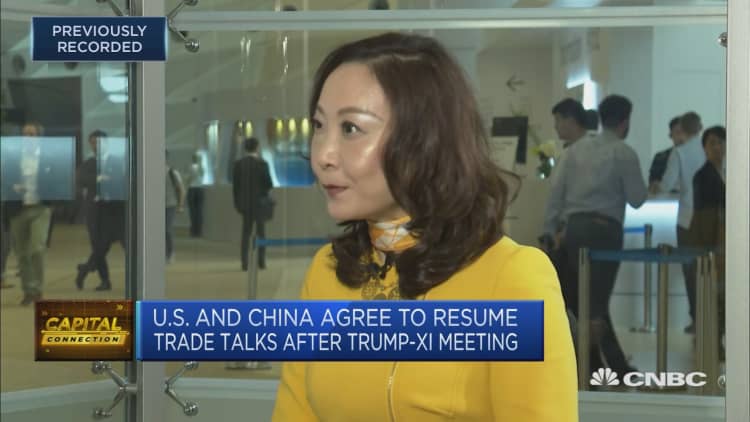
Investors have cheered since the U.S. and China have agreed at least temporarily not to escalate trade tensions — and markets' optimism will last for a couple months, an executive from J.P. Morgan Chase predicted on Monday.
U.S. President Donald Trump and Chinese President Xi Jinping met over the weekend at the G-20 summit in Japan, where they agreed to hold off on further tariffs against each other's products. That news sent most stock markets in the Asia Pacific region higher on Monday, with mainland Chinese shares leading the gains.
"I think for now, markets have taken on a more optimistic and upbeat tone at least since the weekend. And I think this optimistic tone will continue for the next couple months," Jing Ulrich, managing director and vice chair of global banking and Asia Pacific at J.P. Morgan Chase, told CNBC's Geoff Cutmore and Arjun Kharpal.
She explained that developments over the weekend have temporarily removed one uncertainty facing the global economy. That will allow investors to focus on other factors affecting the performance of stocks, such as company earnings and reforms in the Chinese economy, she said at the World Economic Forum in Dalian, China.
Easier monetary policy
Investor sentiment will also benefit from central banks' greater willingness to ease monetary policy, said Ulrich. She said interest rate cuts by major central banks such as the U.S. Federal Reserve and the European Central Bank can help to "reverse some of the negative economic trends" caused at least in part by the trade war.
Still, Ulrich noted that the U.S. and China have not reached a deal to resolve their tensions. That means investors still have to watch how negotiations between the countries progress in the coming months.
"Investors have to choose the sectors where you have earnings growth. At the end of the day, stocks are propelled by earnings growth. Macro environment is important, but corporate fundamentals perhaps are even more important," she added.


